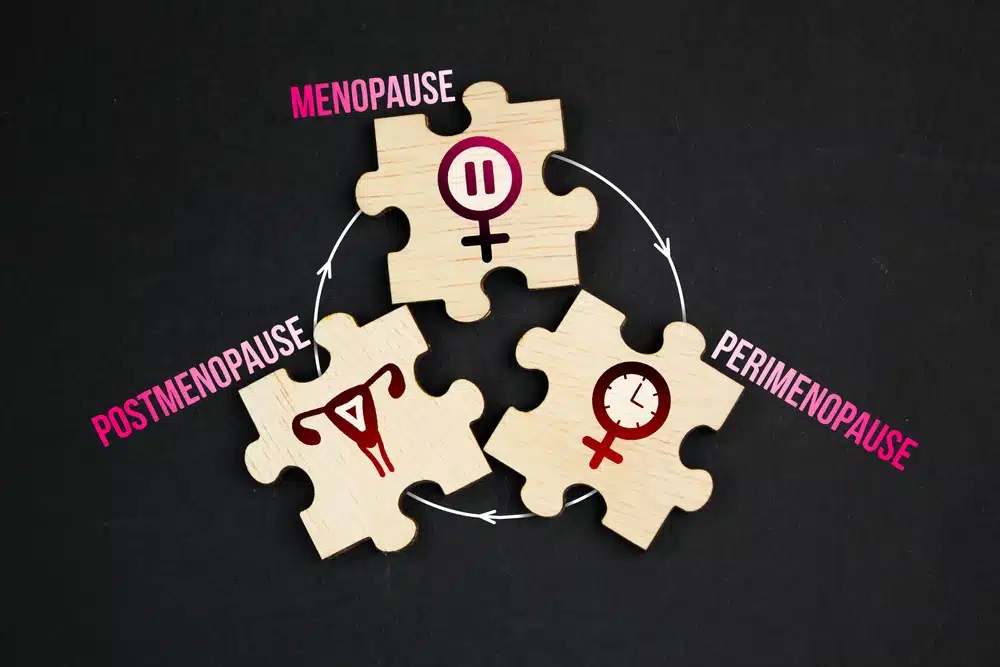
Menopause is a natural biological process that marks the end of a woman's reproductive years, but understanding the journey can help you navigate this transition with greater confidence and comfort. The stages of menopause encompass more than just the cessation of menstrual periods—they represent a gradual transformation that can span several years and affect multiple aspects of your health and wellbeing.
At Revive Integrative Health in Glenview, we focus on helping women understand and manage each phase of this natural transition through comprehensive, personalized care that addresses the whole person, not just individual symptoms.
Perimenopause, often called the "menopause transition," typically begins in a woman's 40s, though it can start as early as the mid-30s or as late as the early 50s. During this phase, your ovaries gradually produce less estrogen, leading to irregular menstrual cycles and the onset of menopausal symptoms.
Key characteristics of perimenopause include:
This phase can last anywhere from a few months to several years, with the average duration being four years. The hormonal fluctuations during perimenopause can be particularly challenging because estrogen levels don't decline steadily—they fluctuate dramatically, sometimes being higher than normal and other times dropping significantly.
Menopause is officially diagnosed when you haven't had a menstrual period for 12 consecutive months, typically occurring around age 51. At this point, your ovaries have significantly reduced their production of estrogen and progesterone, marking the end of your reproductive years.
During this phase, many women experience:
Postmenopause refers to the years following menopause, encompassing the rest of a woman's life. While some menopausal symptoms may continue or even intensify initially, many women find that symptoms like hot flashes gradually decrease over time.
However, the long-term effects of decreased estrogen become more apparent during postmenopause:
Hot flashes affect up to 75% of women going through menopause and can significantly impact quality of life. These sudden surges of heat, often accompanied by sweating and rapid heartbeat, can occur at any time and may last from a few seconds to several minutes.
Natural management strategies include:
Integrative approaches we focus on:
Hormonal fluctuations during the stages of menopause can significantly impact emotional wellbeing. Many women experience increased irritability, anxiety, mood swings, or even depression during this transition.
Supportive strategies include:
Many women notice weight gain during menopause, particularly around the abdomen. This occurs due to hormonal changes that affect metabolism, muscle mass, and fat distribution.
Effective management approaches:
Bioidentical hormone replacement therapy (BHRT) can help manage menopausal symptoms by supplementing the body's declining hormone levels. Unlike synthetic hormones, bioidentical hormones are molecularly identical to those your body produces naturally.
BHRT may help with:
Our clinic focuses on natural remedies and integrative approaches that support your body's ability to manage the menopausal transition:
Nutritional support:
Therapeutic modalities:
Every woman's experience with menopause is unique, and what works for one person may not work for another. At Revive Integrative Health, we believe in creating personalized care plans that address your specific symptoms, health goals, and lifestyle preferences.
Our comprehensive approach includes:
The key to successfully managing the stages of menopause lies in understanding that this is a natural process that doesn't have to diminish your quality of life. With the right support, information, and personalized care approach, you can navigate this transition with confidence and continue to thrive in the years ahead.
Don't let menopausal symptoms control your life. At Revive Integrative Health in Glenview, our experienced team is here to help you navigate the stages of menopause with personalized, compassionate care. We combine the best of conventional and integrative medicine to create a comprehensive approach that addresses your unique needs.
Contact us today to schedule your consultation and discover how we can help you feel your best during this important life transition. Your journey to optimal health and vitality starts here.
"*" indicates required fields